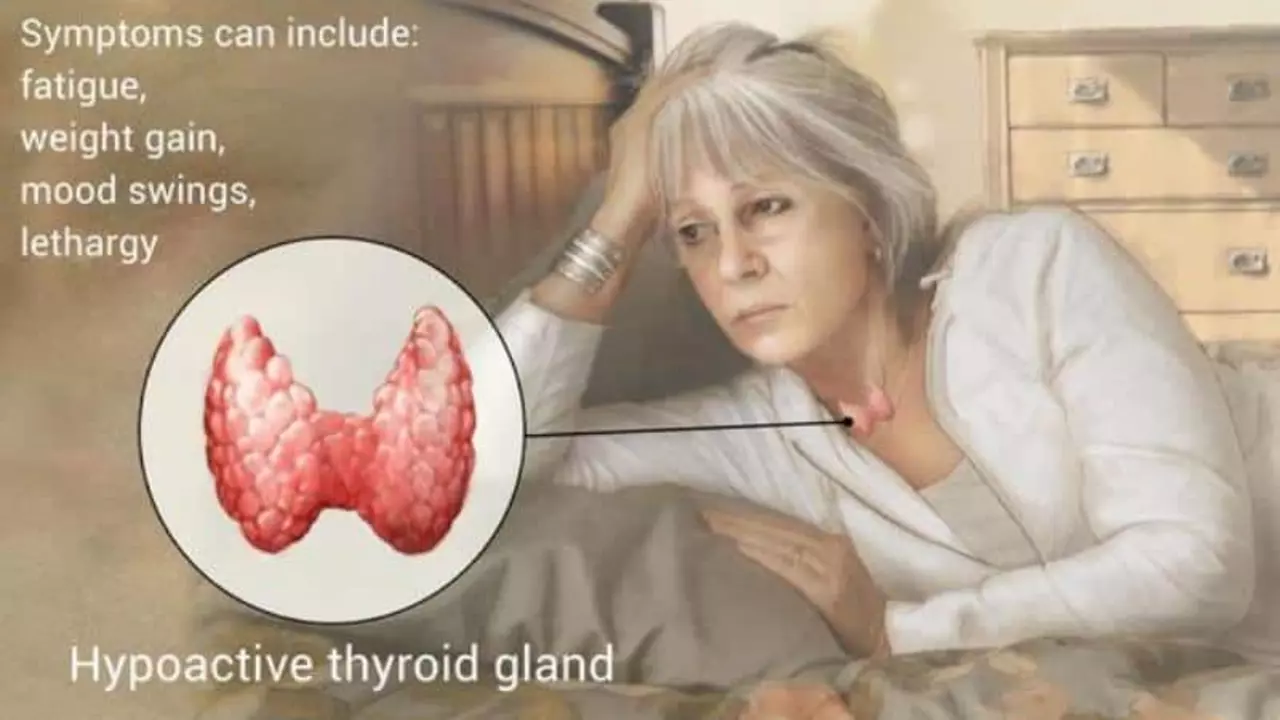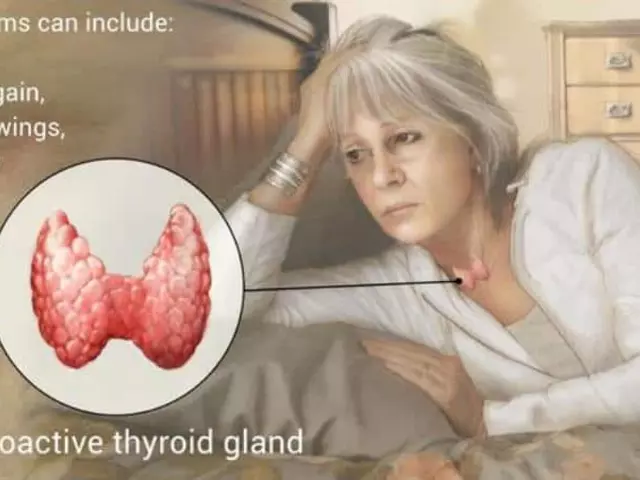Understanding Thyroid Deficiency and Its Effects on Weight
As a blogger, I have encountered many readers who struggle with weight gain and its related issues. One common factor that I've noticed in many cases is a thyroid deficiency, also known as hypothyroidism. In this article, I will explore the connection between thyroid deficiency and weight gain, as well as provide some insight into how to manage this condition and achieve a healthier lifestyle.
What is Thyroid Deficiency?
Thyroid deficiency, or hypothyroidism, is a condition in which the thyroid gland does not produce enough thyroid hormones to meet the body's needs. These hormones, specifically triiodothyronine (T3) and thyroxine (T4), play a crucial role in regulating our metabolism and maintaining overall health.
When the thyroid gland is underactive, it can result in a slowed metabolism, which can contribute to weight gain and other health complications. It is essential to understand the signs and symptoms of thyroid deficiency to seek proper treatment and maintain a healthy lifestyle.
How Thyroid Hormones Affect Weight
Thyroid hormones have a significant impact on our metabolism, the process by which our body converts food into energy. When thyroid hormone levels are low, our metabolism slows down, meaning we burn fewer calories and store more as fat.
This slowed metabolism can lead to weight gain and difficulty losing weight, even with a healthy diet and exercise routine. Additionally, hypothyroidism can cause water retention, further contributing to weight gain and a feeling of bloating or puffiness.
Common Symptoms of Thyroid Deficiency
Besides weight gain, there are several other symptoms associated with thyroid deficiency. Some of the most common signs include fatigue, sensitivity to cold, dry skin, constipation, and hair loss. It is important to note that these symptoms can also be indicative of other health issues, so it's essential to consult with a healthcare professional for proper diagnosis and treatment.
If you suspect you may have a thyroid deficiency, it's crucial to have your thyroid hormone levels checked by a doctor. They can provide the necessary tests to determine if hypothyroidism is the cause of your symptoms and weight gain.
Managing Thyroid Deficiency and Weight Gain
If you have been diagnosed with hypothyroidism, it's important to work closely with your healthcare provider to develop an appropriate treatment plan. This typically involves taking a synthetic thyroid hormone replacement medication, such as levothyroxine, which can help to normalize your hormone levels and alleviate symptoms.
Along with medication, maintaining a healthy diet and exercise routine can also help to manage weight gain associated with thyroid deficiency. It's essential to be patient, as it may take some time for your hormone levels to stabilize and for weight loss to occur.
Importance of Proper Nutrition
Proper nutrition plays a vital role in managing thyroid deficiency and weight gain. Consuming a well-balanced diet rich in whole foods, lean proteins, healthy fats, and plenty of fruits and vegetables can help support overall thyroid health and assist in weight management.
Additionally, certain nutrients, such as iodine, selenium, and zinc, are essential for proper thyroid function. Be sure to incorporate foods rich in these nutrients, such as fish, nuts, and whole grains, into your diet. It may also be helpful to consult with a registered dietitian for personalized nutrition advice.
Exercise and Weight Management
Regular physical activity is a crucial component of managing weight gain related to thyroid deficiency. Exercise not only helps to burn calories and promote weight loss, but it can also improve mood, increase energy levels, and support overall health.
It's important to find an exercise routine that you enjoy and can maintain consistently. This may include activities such as walking, swimming, yoga, or strength training. Be sure to consult with your healthcare provider before starting any new exercise program, especially if you have any pre-existing health conditions or concerns.
Conclusion
Understanding the connection between thyroid deficiency and weight gain is essential for those struggling with hypothyroidism. By working closely with your healthcare provider, maintaining a healthy diet, and incorporating regular exercise into your routine, you can manage your thyroid deficiency and work towards a healthier lifestyle. Remember to be patient with yourself, as weight loss and symptom relief may take time. However, with persistence and dedication, you can achieve your health and wellness goals.



Ah, the ever‑reliable thyroid‑deficiency excuse – as if Big Pharma hasn't been pumping us full of synthetic hormones for decades. One wonders whether the real culprit is a hidden agenda to keep us dependent on medication. Of course, the official story touts "balanced diet" and "regular exercise," but have you ever considered that the iodine in our table salt is deliberately depleted? Perhaps the answer lies in a covert micronutrient conspiracy, not in your sluggish metabolism. Still, if you insist on the mainstream route, checking TSH levels is the first step – albeit a very bureaucratic one.
Hey everyone, just wanted to jump in with some encouragement! First off, understanding how thyroid hormones affect your metabolism is a huge win. It’s amazing how a small gland can have such a big impact on energy levels and weight management. Remember, you’re not alone in this journey – countless folks are navigating the same hurdles. Start by getting your labs checked; a simple blood test can pinpoint whether your T3 and T4 are where they should be. If the numbers are off, your doctor can tailor a dosage that brings you back into balance. While you wait for medication adjustments, focus on whole, nutrient‑dense foods that support thyroid health – think seaweed, Brazil nuts, and lean protein. Keep moving, even if it’s just a gentle walk; consistency beats intensity when your system is rebooting. Celebrate the tiny victories – a day with more energy, a sweater that fits a bit looser, a mood lift after a balanced meal. You’ve got this, and every step forward is progress. Stay patient, stay positive, and keep supporting your body with love and care.
Thyroid issues can feel like a maze, but keeping the basics straight helps. Check your hormone panel, then let the doctor adjust levothyroxine if needed. A balanced diet with iodine, selenium and zinc supports the gland. Gentle exercise keeps metabolism humming without overstressing you. Stay consistent and listen to your body.
Look, Monika, I get the sarcasm, but let’s be real – if you’re already on medication, the next step isn’t a secret cabal, it’s lifestyle tweaks. Prioritize a protein‑rich breakfast to jump‑start metabolism, and add some resistance training twice a week. Even a modest 20‑minute walk can improve insulin sensitivity, which matters when thyroid hormones are low. Also, stay hydrated; dehydration can mask fatigue and make weight loss feel impossible. Keep tracking your symptoms; data beats speculation every time.
Rhea, your optimism is contagious and exactly what people need when dealing with hypothyroidism. It’s tough when daily fatigue drags you down, but those small nutrition wins add up over time. I’ve found that swapping out processed carbs for fiber‑rich veggies steadies blood sugar, which can ease the sluggish feeling. Also, scheduling short, fun activities – like a quick dance session or a yoga flow – can lift mood without overexertion. It’s okay to have off days; the key is to keep showing up for yourself, even in little ways.
Exercise won’t fix low thyroid hormones, so stop wasting time on that myth.
Dave, your pragmatic tone is refreshing, yet the hidden forces at play cannot be ignored. The pharmaceutical narrative deliberately downplays the role of micronutrients, steering patients toward endless prescriptions. Consider integrating iodine‑rich seaweed soups 🍲 and selenium‑laden Brazil nuts, which the mainstream rarely mentions. Keep questioning the authority – it’s the only way to truly reclaim health. And remember, an ounce of skepticism protects you from the next “miracle” pill.
Erin, your compassionate approach aligns well with the scientific method. While emotional support is vital, documenting symptom fluctuations alongside TSH readings provides actionable insight. Ensure your diet includes adequate iodine, but avoid excess, as both deficiency and overload can disrupt synthesis. Consulting a registered dietitian can personalize your intake, especially if you have concurrent autoimmune concerns. Finally, maintain regular follow‑ups with your endocrinologist to fine‑tune dosage based on objective lab trends.